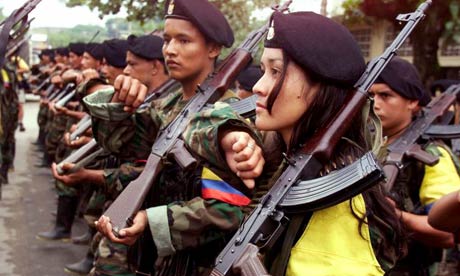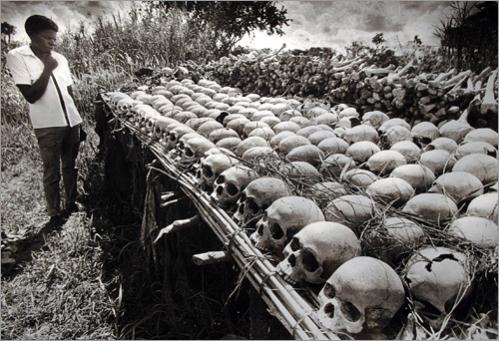US imperialism
Message from SYRIZA to Chicago anti-NATO protests + photos, videos: massive, conscious, determined

Demonstrators defy Chicago police during anti-NATO protest march in Chicago, May 19, 2012.
By Antonis Davanellos and Sotiris Martalis, members of the coordinating secretariat of SYRIZA
May 20, 2012
Dear comrades, dear brothers and sisters of the anti-war movement
We salute your mobilisations against the NATO Summit [in Chicago] and we send you our solidarity from Greece.
We don’t need to say much about the reasons to raise our voices against NATO. Millions of people are familiar with its record or crimes over the last years in the Balkans, in Iraq, in Afghanistan, in Libya to name just a few.
And if we look further back, NATO has provided nothing but wars, dictatorships and terror around the globe, from the day it was founded, and during all the years of its existence.
Video: 'Llaguno Bridge: Keys to a Massacre' on the 2002 US-backed coup against Hugo Chavez
Llaguno Bridge: Keys to a Massacre (Complete Movie) from Estreito Meio Productions on Vimeo.
April 11, 2012 -- NACLA -- 10 years ago, on April 11, 2002, a group of rebelling military officers, together with opposition leaders and the mainstream media, staged a coup d’état against Venezuelan president Hugo Chávez. Nineteen protesters were killed in the confusing events of that day. Chávez was jailed. Pedro Carmona, the head of Venezuela’s elite business federation FEDECAMERAS, was sworn in as de facto president, quickly abolishing the country’s 1999 constitution, disbanding the congress and installing a virtual media blackout.
Less than two days later, however, pro-Chávez supporters descended from the poor barrios around Caracas and Venezuela. They surrounded the presidential palace, Miraflores, and demanded that their president be returned. Within a few hours Chávez was back in power.
Due to the myths, lies and media manipulation, the truth about the events of April 11, 2002 is still often overlooked.
Venezuela: 10 years after the failed US-backed coup, the revolution continues

April 12, 2012 -- Links International Journal of Socialist Renewal -- The April 2012 broadsheet of the Australia-Venezuela Solidarity Network marks the successful defeat of the US-backed coup aginst Venezuela's President Hugo Chavez.
* * *
On April 13, 2012, Venezuelans and supporters of democracy across the world will celebrate the 10-year anniversary of a popular uprising that defeated a US-backed coup against President Hugo Chavez. The day is an important reminder that any attempts by foreign governments and the internal opposition to remove Chavez from power -- whether through coups or at the October 7, 2012, presidential election -- will be met with the popular mobilisation of the people, on the streets and at the ballot box.
On April 11, 2002, the right-wing opposition, backed by the US and private media, organised a military coup that briefly removed Chavezf rom office. The head of the Chamber of Commerce (Fedecamaras) Pedro Carmona was declared president and a decree was issued dissolving the Supreme Court, the constitution and the National Assembly, and fired the ombudsman and the attorney general.
Malalai Joya: Foreign troops must leave Afghanistan

March 25, 2012 -- Green Left Weekly/Links International Journal of Socialist Renewal -- Malalai Joya, a former MP and one of Afghanistan’s best-known democratic leaders, recently survived the sixth attempt on her life. Taliban gunmen attacked her office at 3 am on March 10, wounding two of her guards. In an exclusive interview, she told Green Left Weekly/Links International Journal of Socialist Renewal’s Pip Hinman that “such terrorist acts will never stop my fight for freedom, democracy and justice”.
Joya will visit Australia in April to speak at the Marxism 2012 conference in Melbourne and a Stop the War Coalition public meeting in Sydney on April 11.
* * *
Colombia: The end for guerrilla warfare?

FARC guerillas.
[For more discussion on Colombia, click HERE.]
By Anthony Boynton, Bogotá, Colombia
March 25, 2012 – Links International Journal of Socialist Renewal -- As long as there are sleepy, oppressed, oppressive and isolated villages connected to a city somewhere over the hill by an unpaved road with bridges that might wash out in the next storm, guerrilla warfare will be possible. But those villages are fast disappearing into memory as the extension of electric grids and networks of paved roads extend into every corner of what used to be called the Third World.
Video: Eight myths behind 'Kony 2012'
March 27, 2012 – A video by Green Left Week
Uganda: How the West brought Idi Amin to power

Some of the victims of the Idi Amin regime recovered by local farmers in the fertile fields of the Luwero Triangle region
Uganda: Why 'Kony 2012' will bring more misery to Africa

US Navy special forces.
War crimes, international law and the elephant in the room
By Rupen Savoulian
Syria: Against the Syrian National Council

Members of the self-proclaimed, US-backed Syrian National Council.
By As‘ad Abukhalil

Unity statement by women in the Philippines
